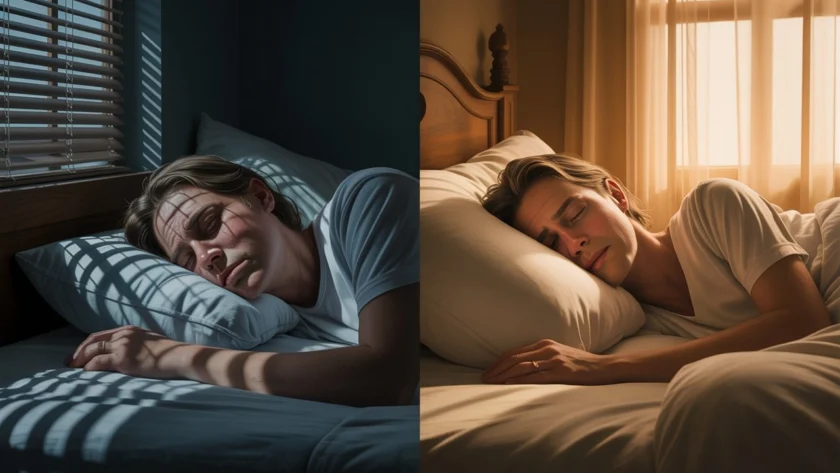If you’re reading this in the middle of the night, or if you’ve noticed your anxiety symptoms getting progressively worse as your sleep gets progressively worse, I want you to know something important: you’re not imagining the connection. After years of battling both insomnia and anxiety, and walking alongside countless others through similar struggles, I’ve come to understand that sleep isn’t just affected by anxiety—it’s one of our most powerful tools for managing it.
Today, I want to share what I’ve learned about breaking this cycle and reclaiming both rest and peace. Because here’s what I wish someone had told me during those sleepless nights: God designed our bodies and minds to heal during sleep, and learning to work with that design rather than against it can transform how we experience anxiety.
The Truth About Anxiety and Sleep (That Nobody Told Me)
For the longest time, I thought my sleep problems were just another symptom I had to endure—like the racing heart or the constant worry. I’d pray for peace, beg God to “turn off my brain,” and feel like a failure when morning came and I’d barely slept.
What I didn’t understand then was that sleep deprivation was actually amplifying every anxiety symptom I experienced. When we don’t sleep, our amygdala—the fear center of our brain—becomes hyperactive. Meanwhile, the prefrontal cortex, which helps us think rationally and manage emotions, basically goes offline. In other words, lack of sleep literally makes us more anxious and less able to cope with that anxiety.
I’ve found it helpful to think of sleep like the reset button on your phone when it’s acting glitchy. Without that reset, everything starts malfunctioning. Your emotional regulation gets wonky, your stress hormones stay elevated, and your ability to put worries in perspective diminishes dramatically.
But here’s where faith intersects beautifully with science: God created this need for rest. He didn’t design us to run 24/7. In fact, one of the first things He modeled for us was the rhythm of work and rest. When I finally started treating sleep as a spiritual discipline rather than just a biological necessity, everything shifted.
Why Anxiety Loves to Show Up at Bedtime
You know that phenomenon where you feel relatively okay during the day, but the moment your head hits the pillow, suddenly you’re mentally rewriting conversations from three years ago and worrying about things that haven’t even happened yet? There’s actually a reason for this, and understanding it helped me stop feeling so alone in those dark hours.
During the day, we’re distracted. We’re moving, working, interacting—our minds are occupied with external demands. But nighttime? Nighttime is quiet. There’s nothing to buffer us from our thoughts, and anxiety rushes in to fill that silence.
I remember my Christian counselor telling me something that changed my perspective: “Amelia, anxiety isn’t afraid of the dark—it’s afraid of the quiet.” She was right. When I stopped running and distracting myself, I had to face what I’d been avoiding all day.
The enemy loves those quiet moments too. Scripture reminds us that the devil “prowls around like a roaring lion looking for someone to devour” (1 Peter 5:8), and I’ve noticed he’s particularly active in those vulnerable hours between waking and sleeping. The lies feel louder when we’re tired and alone.
But this is also where we can meet God in powerful ways. Some of my deepest prayers have happened at 3 AM when I finally stopped fighting and started talking to Him honestly about my fears.
Creating a Sleep Routine That Actually Calms Anxiety
I used to think sleep routines were for children and type-A personalities. I was wrong. Establishing a consistent bedtime routine has been one of the most practical ways I’ve learned to signal my anxious brain that it’s time to wind down.
Here’s what works for me, though I encourage you to adapt this to your own needs and preferences:
The Hour Before Bed
About an hour before I want to be asleep, I start my wind-down. I’ve learned that I can’t go from scrolling through news and social media to peaceful sleep—my brain needs a bridge. I dim the lights throughout my house (bright lights tell your brain it’s still daytime), and I put my phone in another room. Yes, another room. This was hard at first, but it’s been game-changing.
Instead of screens, I do something genuinely relaxing. Sometimes it’s a warm bath with Epsom salts. Sometimes it’s gentle stretching or a few minutes with my gratitude journal. Often, it’s sitting with a cup of chamomile tea and my Bible, reading something from Psalms or Proverbs—passages that remind me of God’s faithfulness rather than passages that require deep theological study.
I’ve found that Psalm 4:8 has become almost like a prayer I breathe into my body: “In peace I will lie down and sleep, for you alone, Lord, make me dwell in safety.” I’ll say it slowly several times, letting each word sink in, reminding myself that my safety doesn’t depend on my vigilance—it depends on God’s faithful care.
The Bedroom Environment
This might sound overly practical for a faith-based article, but I believe God cares about the details of our lives, including where we sleep. I’ve made my bedroom a sanctuary—a place associated only with rest and peace, not with work or worry.
I keep the room cool (around 65-68 degrees), I use blackout curtains, and I run a white noise machine that drowns out the random sounds that used to jolt me awake. I also keep a small lamp with soft, warm light for those nights when I need to read or journal instead of lying there anxious.
On my nightstand, I keep a notepad for the “worry dump.” When my brain starts spinning with things I need to remember or problems I need to solve, I write them down and literally give them to God for the night. “Cast all your anxiety on him because he cares for you” (1 Peter 5:7) isn’t just a nice sentiment—it’s an active practice I do with pen and paper.
Biblical Meditation: The Bridge Between Prayer and Sleep
One of the most transformative discoveries in my anxiety management journey has been the practice of biblical meditation before sleep. This isn’t the empty-your-mind kind of meditation that some people think of—it’s the fill-your-mind-with-truth kind that Scripture actually encourages.
Psalm 63:6 says, “On my bed I remember you; I think of you through the watches of the night.” David wasn’t lying awake worrying—he was redirecting his nighttime thoughts toward God. I’ve learned to do something similar.
I choose a short verse or phrase before bed and focus on it as I’m falling asleep. My favorites include:
“The Lord keeps watch over you” (Psalm 121:5) “Peace I leave with you” (John 14:27) “I am with you always” (Matthew 28:20) “Do not be anxious about anything” (Philippians 4:6)
Instead of counting sheep, I breathe in these truths. Inhale: “The Lord keeps watch.” Exhale: “I can rest.” It sounds simple, but it’s profound. I’m training my brain to associate bedtime with God’s presence rather than with my fears.
Some nights, when anxiety is particularly persistent, I’ll use a longer passage. Psalm 23 has walked me through many sleepless nights. I imagine each verse as a scene I’m stepping into: lying down in green pastures, walking beside still waters, being led in right paths. By the time I reach “I will dwell in the house of the Lord forever,” I’m usually either asleep or profoundly peaceful.
When Sleep Won’t Come: Reframing the 3 AM Wake-Up
Let me be honest: even with all these tools, I still have nights when sleep eludes me. And I’ve had to learn that those nights don’t mean I’ve failed or that God isn’t listening.
I used to lie there feeling frustrated and defeated, watching the hours tick by and calculating how exhausted I’d be the next day. That mental math never helped—it just added performance anxiety to my already anxious state.
Now, when I wake at 3 AM with my heart pounding, I have a different script. Instead of “This is terrible, I’ll never fall back asleep,” I tell myself: “Okay, I’m awake. This is an opportunity to meet with God while the world is quiet.”
Sometimes I get up. I know the conventional wisdom says to stay in bed, but I’ve found that getting up and sitting in my reading chair with a blanket, a soft light, and my Bible can break the anxiety cycle better than lying there fighting. I’ll read, pray, or journal until I feel genuinely tired again. Then I go back to bed without any pressure or timeline.
I’ve also learned to surrender the outcome. Some nights I sleep well, some nights I don’t, but my worth and God’s love for me aren’t determined by the number on my sleep tracker. Jesus himself spent whole nights in prayer—sleep isn’t the ultimate goal; communion with God is.
This shift in perspective has actually reduced my nighttime anxiety significantly. When I stopped fearing sleeplessness, it lost much of its power over me.
The Physical Tools That Support Spiritual Practice
While I believe deeply in the power of prayer and God’s peace, I also believe God gave us bodies that function according to certain principles. Ignoring those principles isn’t more spiritual—it’s less wise. Here are some practical, physical tools I use to support my sleep:
Magnesium Before Bed
After consulting with my doctor, I started taking magnesium glycinate about an hour before bed. Many people who struggle with anxiety are actually deficient in magnesium, and this particular form helps calm the nervous system and relax muscles. It’s not a sleeping pill—it’s a supplement that supports the body’s natural ability to rest.
The 3-2-1 Rule
I try to follow what I call the 3-2-1 rule: no large meals 3 hours before bed, no liquids 2 hours before bed (to avoid middle-of-the-night bathroom trips), and no screens 1 hour before bed. It’s not always perfect, but consistency here has made a noticeable difference.
Movement During the Day
I’ve noticed that my sleep is significantly better on days when I’ve moved my body—even just a 20-minute walk. Exercise helps burn off excess cortisol and adrenaline that anxiety produces. I like to think of it as physically processing the stress that my mind has been carrying.
However, I’ve learned that intense exercise too close to bedtime can actually be stimulating, so I try to get my movement in earlier in the day. When evening comes, I stick to gentle stretching or restorative yoga poses.
Limiting Caffeine (Sadly)
This one was hard for me. I love my morning coffee ritual, and for a long time I was drinking it throughout the day. But I discovered that caffeine has a half-life of about 6 hours, meaning that afternoon cup of coffee was still affecting my system at bedtime. I now cut myself off by noon, and I’ve noticed a real difference in how quickly I fall asleep.
Teaching Your Body to Feel Safe
One of the most profound things my therapist told me was this: “Your anxiety isn’t trying to harm you—it’s trying to protect you. But it’s gotten the signals confused.”
Our bodies’ anxiety response is actually God’s design for keeping us safe from real danger. The problem is that anxiety disorders make our bodies think we’re in danger when we’re actually safe—especially at night, when we’re vulnerable and lying still in the dark.
Part of my sleep journey has been teaching my body that bedtime is safe. I do this through something called “progressive muscle relaxation.” Starting with my toes and working up to my head, I tense and then release each muscle group while reminding myself: “I am safe. God is watching over me. I can relax.”
It sounds overly simple, but the physical act of releasing tension while speaking truth has helped rewire my nervous system’s response to bedtime. I’m no longer approaching sleep as something to fear or fight—I’m approaching it as a gift from God that my body knows how to receive.
The Long Game: Building Sleep Trust Over Time
I want to be realistic with you: if you’ve struggled with anxiety and sleep problems for years, one good bedtime routine won’t fix everything overnight. This is a long game, and there will be setbacks.
I still have rough nights. I still have seasons when anxiety flares and sleep becomes elusive again. But now I have tools, and more importantly, I have a different relationship with sleep itself.
I’ve learned to think of sleep as a trust exercise with God. Every night I lie down, I’m practicing the belief that I can release control, that the world will keep spinning without my vigilance, and that God will be faithful to meet my needs—including my need for rest.
Hebrews 4:9-10 says, “There remains, then, a Sabbath-rest for the people of God; for anyone who enters God’s rest also rests from their works, just as God did from his.” Sleep is our nightly practice of this principle—stopping our striving and trusting God to handle what we cannot.
Some nights that trust comes easily. Other nights I have to wrestle for it, crying out to God through tears and exhaustion. Both kinds of nights are okay. Both are part of the journey.
Finding Hope in the Dark Hours
If you’re reading this at 2 AM, feeling desperate and exhausted, I want you to know: you are not alone. God is with you in this moment, and your struggle with sleep and anxiety doesn’t disappoint Him or disqualify you from His love.
The tools I’ve shared—the bedtime routines, the biblical meditation, the physical practices—they’re all helpful. But they’re helpers, not saviors. Your ultimate hope isn’t in perfect sleep hygiene; it’s in a God who “neither slumbers nor sleeps” (Psalm 121:4) so that you can.
Start small. Pick one thing from this article to try tonight. Maybe it’s putting your phone in another room. Maybe it’s writing your worries on paper and giving them to God. Maybe it’s simply praying Psalm 4:8 as you lie down.
And be patient with yourself. Healing—whether it’s from anxiety, insomnia, or both—is rarely linear. There will be good nights and hard nights, progress and setbacks. That’s not failure; that’s being human.
I’ve discovered that sometimes God uses our sleepless nights to draw us closer to Him, to teach us deeper dependence, to show us that His grace is sufficient even when our sleep isn’t. And sometimes He uses the simple, practical tools He’s wired into creation—rest, routine, physical care—to bring the healing we’ve been praying for.
Either way, He’s with you. In the dark hours and the light ones. In the restful nights and the restless ones.
May you find both the sleep and the peace you’re seeking, and may you discover that they’re both gifts from the One who loves you more than you can imagine.
Sweet dreams, friend. And if sleep doesn’t come tonight, may you find Jesus waiting in the quiet, ready to keep watch with you until morning breaks.




